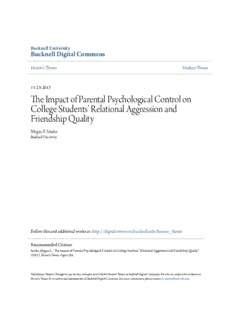Table Of ContentBucknell University
Bucknell Digital Commons
Honors Theses Student Theses
2013
The Impact of Parental Psychological Control on
College Students’ Relational Aggression and
Friendship Quality
Megan F. Snider
Bucknell University
Follow this and additional works at:https://digitalcommons.bucknell.edu/honors_theses
Recommended Citation
Snider, Megan F., "The Impact of Parental Psychological Control on College Students’ Relational Aggression and Friendship Quality"
(2013).Honors Theses. 286.
https://digitalcommons.bucknell.edu/honors_theses/286
This Honors Thesis is brought to you for free and open access by the Student Theses at Bucknell Digital Commons. It has been accepted for inclusion in
Honors Theses by an authorized administrator of Bucknell Digital Commons. For more information, please [email protected].
The Impact of Parental Psychological Control on College Students’
Relational Aggression and Friendship Quality
by
Megan F. Snider
A Thesis
Presented to the faculty of
Bucknell University
In partial fulfillment of the requirements for the degree of
Bachelor of Arts with Honors in Psychology
November 25, 2013
Approved by:
___________________________
Adviser: Chris Boyatzis
___________________________
Department Chair Person: T. Joel Wade
iv
Acknowledgements
First, I would like to thank my adviser, Chris Boyatzis, for helping to make this
thesis study possible. His guidance and support have helped me to learn and grow as a
student and as a researcher. Working with him to complete this study has given me
invaluable experience in conducting research and has taught me a lot about myself as a
person and a student. I am extremely thankful for his time and commitment to this study.
I would like to thank my family and friends for supporting me throughout the
research process. Their love and emotional support helped me to complete this study. I
would also like to thank my research group for listening to my ideas, reading drafts, and
providing me with suggestions and encouragement throughout the process.
Finally, I would like to thank the students who participated in the study and my
defense committee members, Kim Daubman and Janice Traflet.
v
Table of Contents
Page
List of Tables………………………………………………………………………. vii
List of Figures……………………………………………………………………… viii
Abstract…………………………………………………………………………….. 1-2
Introduction………………………………………………………………………... 3-13
Psychological Control and Relational Aggression 4
Psychological Control and Friendship Quality 5
How is Relational Aggression Related to Friendship Quality? 6
The Role of Other Parenting Behaviors 9
Hypotheses 12
Method……………………………………………………………………………… 13-20
Participants 13
Procedure 16
Measures 16
Results……………………………………………………………………………… 20-46
Does Psychological Control Predict Relational Aggression? 21
Does Psychological Control Predict Friendship Quality? 25
Does Psychological Control Predict Other Peer Relationship Variables? 27
Does Relational Aggression Predict Friendship Quality? 31
Mediation Analyses: Relational Aggression as a Link between 33
Psychological Control and Friendship Quality
vi
Mediation Analyses: Friendship Quality as a Link between 36
Psychological Control and Relational Aggression
Moderation Analyses: Effects of Parenting Behavior Combinations 40
Discussion………………………………………………………………………… 47-61
Psychological Control and Relational Aggression 47
Psychological Control and Friendship Quality 49
The Relationship between Relational Aggression and Friendship Quality 51
The Influence of Other Parenting Behaviors 55
The Importance of Social Desirability 58
Limitations and Future Directions 58
References………………………………………………………………………… 62-74
Appendix A……………………………………………………………………….. 75-88
vii
List of Tables
Table 1. Individual and Parental Characteristics as a Percentage of the Sample…….14-15
Table 2. Descriptive Statistics for Scores on All Study Measures……………………22
Table 3. Correlations among Study Variables………………………………………...23
Table 4. Hierarchical Regression Analysis Predicting Relational Aggression………..25
Table 5. Hierarchical Regression Analysis Predicting Friendship Quality…………....27
Table 6. Hierarchical Regression Analyses Predicting Other Peer Relationship
Variables………………………………………………………………………30
Table 7. Hierarchical Regression Analysis: Does Relational Aggression
Predict Friendship Quality…………………………………………………….32
viii
List of Figures
Figure 1. Relational Aggression as Mediator between Maternal Psychological
Control and Friendship Quality……………………………………………35
Figure 2. Relational Aggression as Mediator between Paternal Psychological
Control and Friendship Quality…………………………………………....36
Figure 3. Friendship Quality as Mediator between Maternal Psychological
Control and Relational Aggression………………………………………..39
Figure 4. Friendship Quality as Mediator between Paternal Psychological
Control and Relational Aggression……………………………………….39
Figure 5. Maternal Psychological Control and Warmth/Acceptance on
Relational Aggression……………………………………………………...41
Figure 6. Paternal Psychological Control and Warmth/Acceptance on
Relational Aggression……………………………………………………...43
Figure 7. Maternal Psychological Control and Warmth/Acceptance on
Friendship Quality………………………………………………………….44
1
Abstract
The present study investigated the relationships between parental psychological
control and college students’ relational aggression and friendship quality. Based on
previous research, it was expected that parents’ use of psychological control would be
associated with students’ increased use of relational aggression with peers and lower
friendship quality. Students completed a series of survey measures assessing their
mothers’ and fathers’ use of psychological control, behavioral control, and
warmth/acceptance. Students also completed a series of survey measures assessing their
friendship quality, social skills, relational aggression, self-esteem, and social desirability.
The study’s findings revealed that parental psychological control was associated
with and predicted students’ increased use of relational aggression with peers. Parental
psychological control was also associated with students’ lower friendship quality.
However, parents’ use of psychological control did not predict students’ friendship
quality after accounting for the influence of students’ personal and peer relationship
variables. This finding suggests that characteristics of peer relationships may play a
larger role than parenting behaviors in shaping college students’ friendships. The study
also found that students who displayed higher levels of relational aggression had lower
quality friendships. Other findings revealed that the relationship between parental
psychological control and students’ friendship quality can be partially explained by
students’ use of relational aggression with peers. Students’ friendship quality can also
help to explain the influence of parental psychological control on students’ relational
aggression.
2
In addition, the study found that combinations of parenting behaviors were more
informative predictors of students’ relational aggression and friendship quality than
psychological control alone. Finally, this study revealed the importance of assessing
participants’ social desirability when measuring sensitive personal qualities such as
relational aggression, friendship quality, and self-esteem. Overall, this study contributes
to the field of research on parental psychological control by revealing its effects on
college students’ relational aggression and friendship quality.
Description:For more information, please contact
[email protected]. The Relationship between Relational Aggression and Friendship Quality 51.

